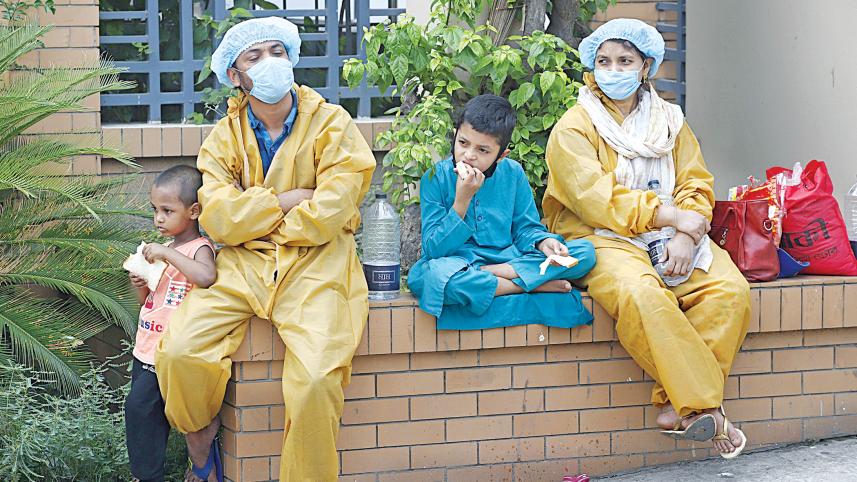Peak in 3rd or last week


A government-appointed committee has said the Covid-19 outbreak may peak in the weeks around the Eid, but several independent experts said it is too early to make such a prediction.
A reliable prediction would have been possible had there been more testing and stricter coronavirus restrictions, they said.
In a report submitted to the Directorate General of Health Services last week, the committee said the outbreak might peak in the third or fourth week of this month and the situation would remain unchanged for almost two weeks, or until the first week of June.
The number of new cases is likely to come down to a "tolerable level" by the end of June, unless the restrictions are relaxed too early, said Prof Shah Monir Hossain, one of the eight members of the committee.
The report contains what officials call an exit plan with recommendations to lift restrictions after June 25.
The health ministry in late March formed the committee to supervise, monitor and support the coronavirus response.
The team includes public health experts MA Foyez, Liaquat Ali, and Iqbal Anwar.
"Our team forecasts... that at the peak, Covid-19 cases may cross the 50,000 mark," said Prof Monir, senior consultant of the World Health Organisation.
By the end of June, when the situation becomes tolerable, there will still be new cases, he added.
It will be quite some time before there will be zero transmission, according to the committee.
"But the crucial thing is we follow restrictions and implement the intervention levels 1, 2, 3 and 4. Then the peak period will be shortened.
"Our prediction will be proved right if we can continue the interventions," Prof Monir said, adding, "If we start lifting restrictions, the predictions will be wrong."
Meanwhile independent experts called for increasing the number of tests to at least 20,000 a day in order to assess the actual situation. Besides, they called for no further lifting of the coronavirus restrictions.
A member of the government committee also admitted that the predictions would have been more reliable if there were more testing.
Hundreds of garment factories started reopening across the country late last month although the number of new cases have been on the rise.
Besides, the government has already lifted restrictions on people gathering at mosques and shopping malls and many other businesses are going to reopen on a limited scale from today.
MORE TESTING
Prof Muzaherul Huq, former adviser (Southeast Asia Region) of the WHO, said, "We won't be able to tell the actual rate and spread of infection until we can increase the number of daily tests.
"We got confined between 5,000 and 6,000 tests. We have to test at least 20,000 people a day. The tests should be done across the country," he told The Daily Star yesterday.
"Then we should observe the rise in the rate of infections. Before that, it's not possible to give a prediction," he said.
He also said the government should not relax the restrictions any further.
"The government should not allow reopening anything like shopping malls and should ensure strict enforcement of the restrictions," he said.
People should be encouraged and involved in the fight against Covid-19, he said.
Infectious diseases specialist Prof Ridwanur Rahman said, "Even though the number of tests is inadequate, we are observing a rising trend in daily detection of cases. The actual number of patients must be much higher."
Covid-19 outbreak usually reaches its peak three or four weeks after the daily new cases rise, he said.
"But, we are enforcing the lockdown halfheartedly. People are partially abiding by it. So, we have no example before us [to make proper predictions]," he said.
"Such a lockdown has not been enforced anywhere in the world. Besides, the lockdown is not enough, we have to find the patients and isolate them."
Asked Prof Shah Monir said, "Such predictions are there to give an idea of how bad the situation might get and to help make a plan in advance."





 For all latest news, follow The Daily Star's Google News channel.
For all latest news, follow The Daily Star's Google News channel.
Comments